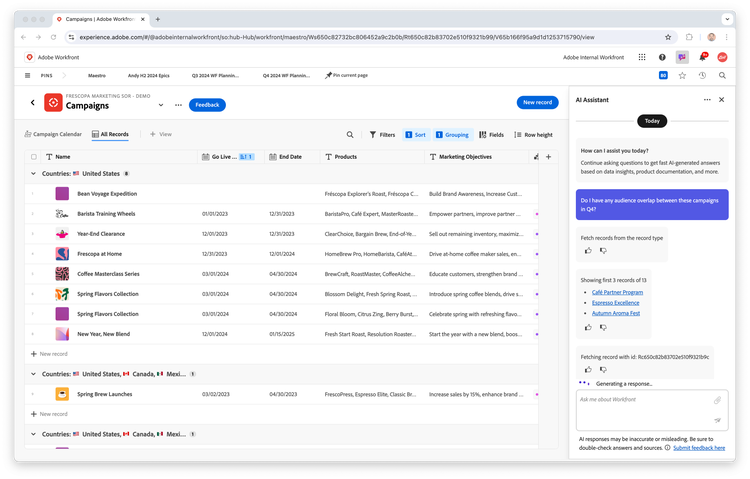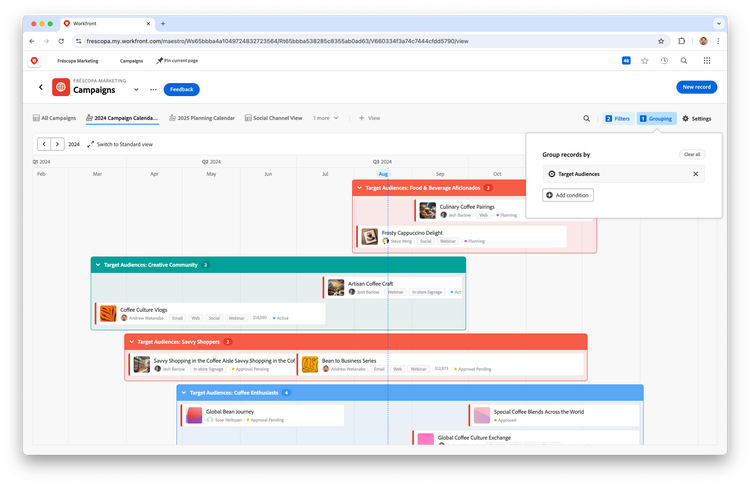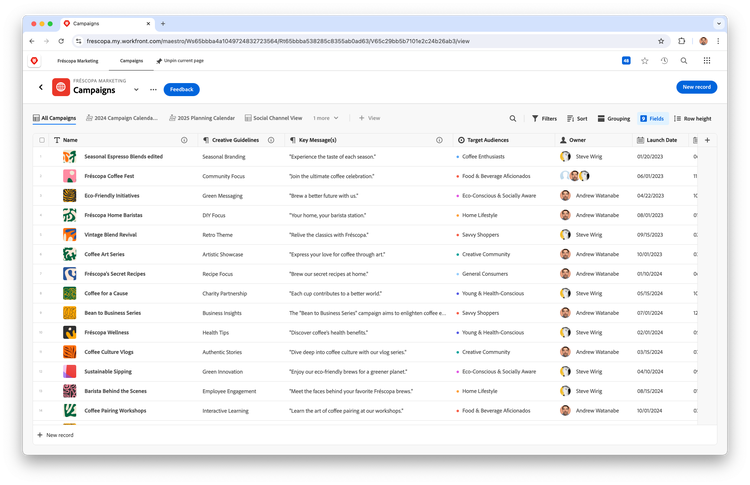Media Alert: Adobe Announces Workfront Planning to Deliver a Unified View of Marketing Campaigns and Drive Faster Execution
Wednesday, August 28, 2024 12:00 AM
- Adobe Workfront Planning is now generally available, delivering a comprehensive view of all marketing activities in an organization, and enabling teams to be more strategic in planning and execution
- A single view of campaign goals, timelines and objectives unlocks meaningful insights for marketers to dramatically shorten the time it takes to launch new campaigns, with a generative AI-powered assistant that supports queries and marketing brief creation
- Global brands including Deloitte, Interpublic Group (IPG) and NASCAR have used Workfront Planning to drive productivity gains for their organizations and meet the rising demand for highly personalized marketing campaigns
SAN JOSE, Calif. — August 28, 2024 — Today, Adobe (Nasdaq:ADBE) announced the general availability of Adobe Workfront Planning. Part of Adobe Workfront, an industry-leading enterprise work management application, this new offering connects fragmented workflows and data across marketing teams, with actionable insights that allow brands to execute campaigns with greater speed. Marketers have been under increasing pressure to deliver highly personalized customer experiences, without any material increase in resources. Workfront Planning addresses this by defining and creating the “metadata” of work, providing full visibility into day-to-day marketing operations. This effectively creates a “marketing system of record”, a practice that has allowed other functions such as sales or finance to power planning and execution with data intelligence.
Instead of manually gathering details across teams, Workfront Planning allows marketers to quickly answer questions such as “How many campaigns are we running this year?” or “Which tactics are most frequently used in our campaigns?”. Users have these actionable insights right at their fingertips, surfaced through both curated visualizations and a generative AI-powered conversational interface. This can dramatically shorten the time it takes to plan and launch new campaigns, removing the labor-intensive work of aligning teams on timing and objectives. Users can also accelerate time-to-market by leveraging generative AI to summarize information, keep marketing records up-to-date or quickly set up new campaigns.
“The daily work of the modern marketer has become increasingly complex, as different teams charge forward on individual campaigns without much visibility into the efforts of their colleagues,” said Amit Ahuja, senior vice president, Digital Experience Business at Adobe. “The net result is fragmented marketing operations where too much time is spent trying to align programs and stakeholders, a problem Workfront Planning solves by providing a centralized solution to plan campaigns, deliver marketing briefs and orchestrate work across teams.”
Workfront Planning capabilities include:
- Curated visualizations: The marketing calendar in Workfront Planning visualizes day-to-day marketing work in an easy-to-digest format. For instance, a timeline view displays all active campaigns in a chronological format that is customizable for any team or stakeholder. A user can automatically view campaigns targeting a certain audience (e.g., loyalty program members) or for a specific objective (e.g., holiday season promotion). A spreadsheet view provides a deeper look into each campaign, providing end-to-end visibility on key messages, individual contributors, project status and more.
- Brief creation with generative AI: When marketers are ready to create a new campaign, generative AI-powered capabilities will soon enable users to take action on previously static plans. Marketers will be able to simply upload existing assets (such as a presentation deck detailing the project) to create campaign records and generate a marketing brief. This curated view will include everything from marketing tactics and objectives to relevant assets and timelines. The conversational interface in Workfront Planning, powered by generative AI, also allows users to query details across campaigns, helping answer pressing questions that come up during planning stages.
- Easy record keeping: Effective planning hinges on marketing records that are accurate and up-to-date. These records can include details such as target audience and region, tactics, relevant business unit and more—also known as the “metadata” of marketing. With the generative-AI powered conversational interface, users can automatically create or update records as plans evolve. Marketers simply upload an asset, such as a Word document with the latest campaign details, and the record is automatically updated. Records can then be connected into a marketing graph, which visualizes the connections between teams and workflows. This produces additional insights to drive alignment and shortens the time it takes to get campaigns into market.
Global brands from Deloitte and IPG Health (part of Interpublic Group) to NASCAR have used Workfront Planning to boost productivity and meet the rising demand for highly personalized marketing campaigns. The new offering is also having an impact on the Adobe Global Marketing Organization, by enabling teams to develop coordinated plans and gain full visibility into marketing activities. To see how Adobe built its marketing system of record, visit here.
About Adobe
Adobe is changing the world through digital experiences. For more information, visit www.adobe.com.
© 2024 Adobe. All rights reserved. Adobe and the Adobe logo are either registered trademarks or trademarks of Adobe in the United States and/or other countries. All other trademarks are the property of their respective owners.
Public relations contact
Kevin Fu
Adobe
kfu@adobe.com
Nisa Chavez Taylor
Adobe
nchaveztaylo@adobe.com


